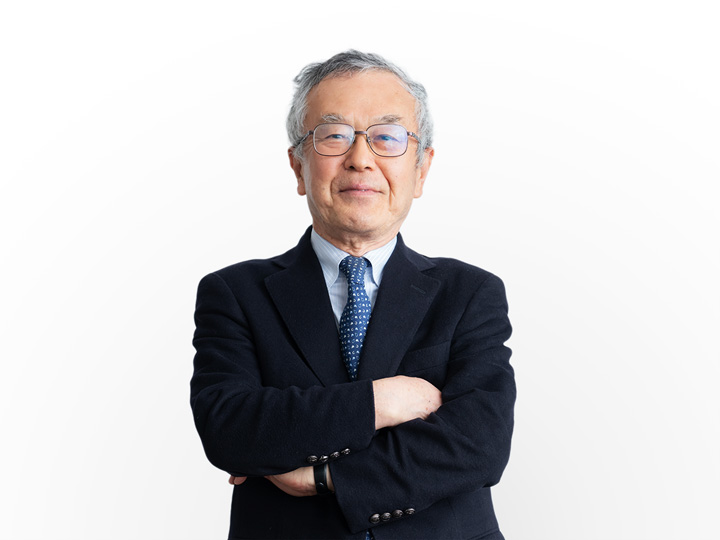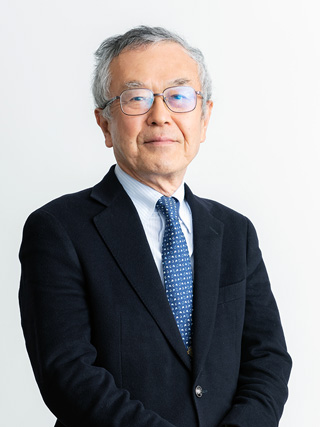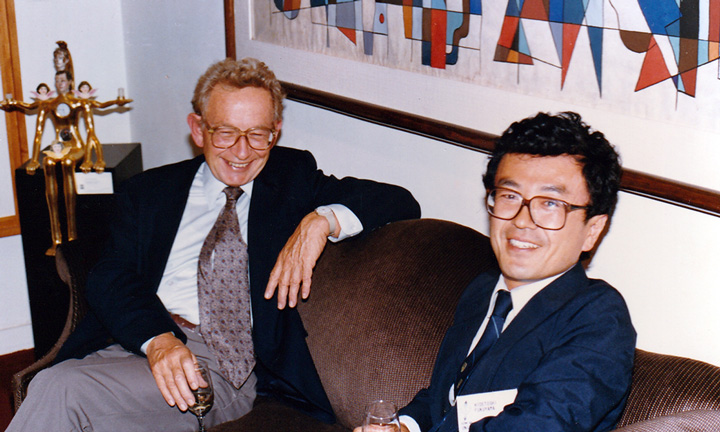- Home
- > Outreach
- > Publications
- > CONVERGENCE
- > LEADER’S VOICE
 LEADER’S VOICE
LEADER’S VOICE
A Conversation with Prof. Hidetoshi Fukuyama
The vibrant environment creates new research achievements.

Good research themes never fade
—WPI-MANA conducts basic research on nanotechnology and materials science. As an advisor for WPI-MANA, what should a young researcher aim for in research life? What does the research theme mean in terms of the basic research?
Basic research does not mean "anything is ok." Considering the meaning of life as a researcher, the setting of the research theme is very important. If you do not focus on "meaningful research," then what is the research for? The problem is how to come across "good theme." Regarding this, the "environment," which includes advisors and senior graduate students in graduate schools, plays a crucial role.
—Professor Fukuyama, you began your research career with a member of the laboratory, hosted your own laboratory later, and led the Institute for Solid State Physics. Is your early research theme special even now?
Yes. Sometimes, I find myself pursuing my old research theme, which was raised by my mentor. Good research themes never fade. After learning basic knowledge in graduate school, we shift to the full-scale research stage, but I came to recognize that there is no difference between "basic research" and "applied research." Professor Ryogo Kubo, my mentor in graduate school, had been saying the same thing. It is embarrassing that I did not notice it until recently. I remember that he said, "There is no difference between basic research and applied research, but trivial research and essential research." Professor Kotaro Honda, who was one of founders of Tohoku University and served as the first president of the Tokyo University of Science, said, "Industry is a hall for science." I understand that this statement is similar in meaning. Science develops in attempts to solve a series of industrial challenges. It means that applied research is based on basic research, and basic research leads to new applied research studies. Progress is in tandem and simultaneous. Recently, I started describing this philosophy as "科技拓新" (Science opens up technology and technology deepens science).
Basic research does not mean "anything is ok." Considering the meaning of life as a researcher, the setting of the research theme is very important. If you do not focus on "meaningful research," then what is the research for? The problem is how to come across "good theme." Regarding this, the "environment," which includes advisors and senior graduate students in graduate schools, plays a crucial role.
—Professor Fukuyama, you began your research career with a member of the laboratory, hosted your own laboratory later, and led the Institute for Solid State Physics. Is your early research theme special even now?
Yes. Sometimes, I find myself pursuing my old research theme, which was raised by my mentor. Good research themes never fade. After learning basic knowledge in graduate school, we shift to the full-scale research stage, but I came to recognize that there is no difference between "basic research" and "applied research." Professor Ryogo Kubo, my mentor in graduate school, had been saying the same thing. It is embarrassing that I did not notice it until recently. I remember that he said, "There is no difference between basic research and applied research, but trivial research and essential research." Professor Kotaro Honda, who was one of founders of Tohoku University and served as the first president of the Tokyo University of Science, said, "Industry is a hall for science." I understand that this statement is similar in meaning. Science develops in attempts to solve a series of industrial challenges. It means that applied research is based on basic research, and basic research leads to new applied research studies. Progress is in tandem and simultaneous. Recently, I started describing this philosophy as "科技拓新" (Science opens up technology and technology deepens science).
What should be transfered to young researchers is to understand "What is research?"

Hidetoshi Fukuyama
Director, Research Institute for Science and Technology, Tokyo University of Science,Research Adviser to the President, Tokyo University of Science
—You have been conducting solid state physics research for a long time. Are there any parts that seem to have changed by comparing today's environment with the research environment of the past?
Yes. I think that researchers could pursue science purely back in the day. In that respect, today's young researchers are in a very unfortunate situation, largely because of the introduction of various kinds of evaluation. Unlike in the past, today's young researchers are being asked for "evidence" of the validity of their research. It means that research studies are quite often being evaluated by the name of the journal(s) in which their papers are published, not by their quality. This is an extremely serious situation. Originally, the main purpose of publishing papers was to report the facts accurately to society, but now I feel that the practice is becoming a publicity tool.
—By introducing those indices, the process of evaluation has become easy, but we often hear that there is the risk that researchers may tend to prioritize research studies just to be evaluated.
I have strong feelings about the situation whereby papers must be published in a specific journal to be evaluated. It is my personal opinion that commercial journals publish magazines not to report scientific progress, but for business purposes not always but quite often. This situation is obvious because they are "commercial" journals. It seems that research is being evaluated according to the impact factor, but that is a big mistake. Since the impact factor is an index for magazines or journals, it should not be related to the quality of individual research. I often hear expressions like "published in xx magazine, which has a high impact factor," and I feel that this kind of phrase is similar to the expression used by prep school (e.g., "xx students went to xx university from our school"). If young researchers are tossed based on a commercial magazine's "business strategy," it is a very serious situation.
—So, what kind of attitude is necessary to properly evaluate research?
I believe that the most important thing is to understand the contents of individual papers, and then pay attention to the number of citations and keynote and invited lecturers at international conferences. For young researchers to understand "what research is all about,"mentors and senior scientists have to properly lead them how to determine research themes, conduct research, make good presentations, and so on. If these aspects are not emphasized, researchers could get stuck in the future.
Yes. I think that researchers could pursue science purely back in the day. In that respect, today's young researchers are in a very unfortunate situation, largely because of the introduction of various kinds of evaluation. Unlike in the past, today's young researchers are being asked for "evidence" of the validity of their research. It means that research studies are quite often being evaluated by the name of the journal(s) in which their papers are published, not by their quality. This is an extremely serious situation. Originally, the main purpose of publishing papers was to report the facts accurately to society, but now I feel that the practice is becoming a publicity tool.
—By introducing those indices, the process of evaluation has become easy, but we often hear that there is the risk that researchers may tend to prioritize research studies just to be evaluated.
I have strong feelings about the situation whereby papers must be published in a specific journal to be evaluated. It is my personal opinion that commercial journals publish magazines not to report scientific progress, but for business purposes not always but quite often. This situation is obvious because they are "commercial" journals. It seems that research is being evaluated according to the impact factor, but that is a big mistake. Since the impact factor is an index for magazines or journals, it should not be related to the quality of individual research. I often hear expressions like "published in xx magazine, which has a high impact factor," and I feel that this kind of phrase is similar to the expression used by prep school (e.g., "xx students went to xx university from our school"). If young researchers are tossed based on a commercial magazine's "business strategy," it is a very serious situation.
—So, what kind of attitude is necessary to properly evaluate research?
I believe that the most important thing is to understand the contents of individual papers, and then pay attention to the number of citations and keynote and invited lecturers at international conferences. For young researchers to understand "what research is all about,"mentors and senior scientists have to properly lead them how to determine research themes, conduct research, make good presentations, and so on. If these aspects are not emphasized, researchers could get stuck in the future.
Collaborative reserch opens unexplored research fields
—Most research is being conducted on a group-by-group basis in WPI-MANA. Now, we are also focusing on research activities that traverse group units. What do you think about joint research activities?
Collaborative research activity should be highly recommended because, in research,1 + 1 can equal 3 or 4. I have been at Bell Laboratories since I was 31, and Bell Labs at that time had such an environment. I remember that respected researchers, including Philip Anderson (Nobel Prize laureate in Physics in 1977), engaged in discussions with loud voices in the hallway or during lunch. I learned the importance of discussions and recognized that they could be fun. In addition, there were a lot of parties for researchers, and I understood that human interactions are essential for research. In research activities, sometimes unknown facts come to the forefront through the exchange of opinions between theoreticians and experimentalists. Since I experienced that environment at Bell Laboratories, I have tried to preserve the attitude that "experiment underlies theory" through communications with experimentalists. As a theoretician, I have been very happy to be introduced to an unknown interesting phenomenon first.
Collaborative research activity should be highly recommended because, in research,1 + 1 can equal 3 or 4. I have been at Bell Laboratories since I was 31, and Bell Labs at that time had such an environment. I remember that respected researchers, including Philip Anderson (Nobel Prize laureate in Physics in 1977), engaged in discussions with loud voices in the hallway or during lunch. I learned the importance of discussions and recognized that they could be fun. In addition, there were a lot of parties for researchers, and I understood that human interactions are essential for research. In research activities, sometimes unknown facts come to the forefront through the exchange of opinions between theoreticians and experimentalists. Since I experienced that environment at Bell Laboratories, I have tried to preserve the attitude that "experiment underlies theory" through communications with experimentalists. As a theoretician, I have been very happy to be introduced to an unknown interesting phenomenon first.
Objectivity in papers and identity in research
—What do you think about collaborative research, not only with theorists and experimentalists, but also interdisciplinary research studies?
In the study of physical properties, the research targets are materials that are aggregates of atoms and molecules, so there are infinite possibilities; furthermore, new and amazing phenomena are constantly emerging. I think that bio-related research studies will come on stage in the near future. Even if the research topics change, the importance of physical science remains unchanged. In fact, it will increase in the future. It is meaningful that you strive to tackle new research subjects while interacting with many researchers. The key to creating such an atmosphere is the environment. Historically, a great discovery emerged from excellent environment. Focusing on creating a mechanism to promote exchanges among researchers is the first priority of a research organization.
—Can you give me a message for young researchers?
It is difficult to answer this question with a word, but it is extremely important to acquire external funds because it is impossible to continue your research without a budget. However, repeatedly, being too conscious of a reputation in order to acquire research funds is not a scientific attitude. Ideally, promoting interesting research that will encourage people to provide funds is the best way. Needless to say, to have objectivity in mind when you report your research results to society is necessary. At the same time, in the process of striving for research results, having "identity" and "individuality" in your research is essential for attracting people. I believe that this "personal part”of the research activity is the most interesting and motivating part for us as researchers. It is related to the environment, which creates a free exchange of ideas between researchers. This is what I expect from WPI-MANA.
In the study of physical properties, the research targets are materials that are aggregates of atoms and molecules, so there are infinite possibilities; furthermore, new and amazing phenomena are constantly emerging. I think that bio-related research studies will come on stage in the near future. Even if the research topics change, the importance of physical science remains unchanged. In fact, it will increase in the future. It is meaningful that you strive to tackle new research subjects while interacting with many researchers. The key to creating such an atmosphere is the environment. Historically, a great discovery emerged from excellent environment. Focusing on creating a mechanism to promote exchanges among researchers is the first priority of a research organization.
—Can you give me a message for young researchers?
It is difficult to answer this question with a word, but it is extremely important to acquire external funds because it is impossible to continue your research without a budget. However, repeatedly, being too conscious of a reputation in order to acquire research funds is not a scientific attitude. Ideally, promoting interesting research that will encourage people to provide funds is the best way. Needless to say, to have objectivity in mind when you report your research results to society is necessary. At the same time, in the process of striving for research results, having "identity" and "individuality" in your research is essential for attracting people. I believe that this "personal part”of the research activity is the most interesting and motivating part for us as researchers. It is related to the environment, which creates a free exchange of ideas between researchers. This is what I expect from WPI-MANA.
■■■

Prof. Fukuyama having a chat with Prof. Phillip W. Anderson in 1985.
Hidetoshi Fukuyama
1942.7.31 Born in Tokyo.
1970.3 Ph.D. Tokyo University.
1970.4 Research Fellow - Tohoku University.
1971.7-1973.3 Post-doc, Division of Engineering and Applied Physics, Harvard University.
1973.4-1974.3 Post-doc, Bell Telephone Laboratories, Murray Hill NJ.
1974.10 Associate Professor, Faculty of Science, Tohoku University.
1977.4 Associate Professor, Institute for Solid State Physics, Tokyo University.
1984.4 Professor, Institute for Solid State Physics, Tokyo University.
1992.4 Professor, Faculty of Science, Tokyo University.
1999.2 Professor, Institute for Solid State Physics, Tokyo University.
2003.10 Professor, Institute for Materials Research, Tohoku University.
2004.6 Professor Emeritus, Tokyo University.
2006.6-2016.3 Professor, Tokyo University of Science.
2016.4- Research Adviser to the President, Tokyo University of Science.
● Administration ●
1999.4-2003.3 Director, Institute for Solid State Physics, Tokyo University.
1999.10-2002.10 Secretary, Commission 5 (Low Temperature Physics), IUPAP.
1999.10-2006.4 Member of Working Group "Women in Physics", IUPAP.
2002.10-2005.10 Vice President, IUPAP (Also Chair of Commission 5).
2004.4 Director, International Frontier Center for Advanced Materials, Tohoku University.
2006-2007 Member of Committee on CMMP2010, NSF.
2008.1-2016.3 Director, Research Institute for Science and Technology, Tokyo University of Science.
2010.1-2013.12 Vice President, Tokyo University of Science. ※ IUPAP: International Union of Pure and Applied Physics.
● Honor ●
1985.11 Fellow, American Physical Society.
1987.12 1st IBM Japan Science Prize.
1999.4 2nd Science and Technology Prize of Superconductivity.
2003.4 National Medal with Purple Ribbon.
2015.11 The Order of Sacred Treasure, Gold Rays with Neck Ribbon.
2016.11 Person of Cultural Merit.
2017.3 Honorary Member of Physical Society of Japan.

